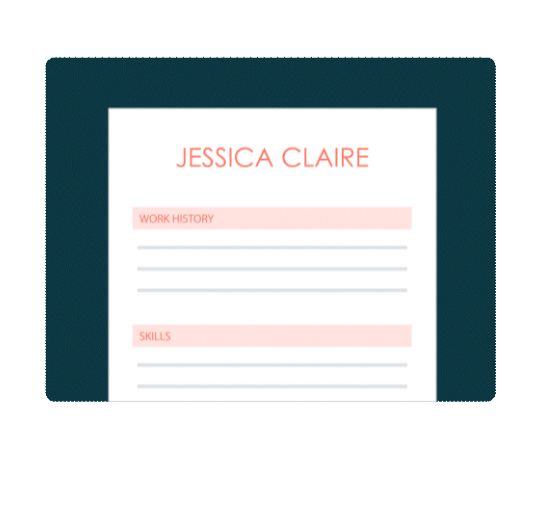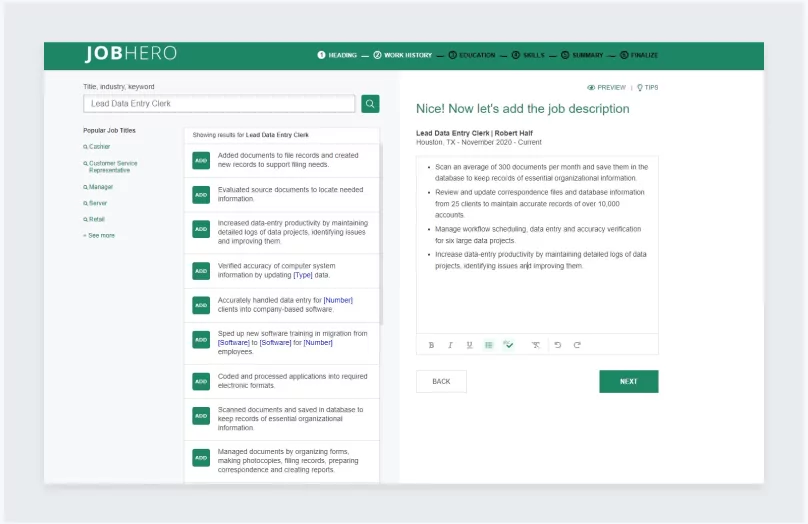What was the biggest problem you have faced professionally, and how exactly did you approach that problem? This type of behavioral interview question may seem daunting during, but it is one that job applicants need to anticipate and be prepared to answer. The interviewer is not trying to make you uncomfortable or stump you. The company needs to know that the people they hire are good at problem solving. Why? Because problems arise every day on the job. Some are small and easy to fix. Others are large and have a significant impact on the business. The company needs employees that perform well under stress and can handle problems on their own.
Interested in a cover letter? Our cover letter builder walks you step-by-step through the process of writing your own. With pre-written text suggestions for every section of your letter, writer's block will be a thing of the past.

Create your professional resume in just minutes.
- Choose from 20+ recommended templates
- Add pre-written experiences, skills and summary
- Download and send
- Featured in:
Why the Interviewer Asks This Question
The hiring manager wants to know that you are properly equipped to deal with challenges before making you a part of their team. How you solve problems that pop up will directly affect the success of their team. By asking problem solving interview questions, the interviewer can determine several competency areas in a short amount of time. Your answer will provide clues to all of the questions below.
- Do you have initiative? Are you willing to step up to a challenge when it presents itself? Will you solve problems without your boss holding your hand? Do you have the edge the company needs? Can you think on your feet?
- Are you an analytical thinker? By asking how you approach a problem, the interviewer can tell if you use logical thinking in your daily life. They can also tell if you are results oriented by listening to your explanation. Did you jump right on the problem? Did you take the time to gather your thoughts and all of the information first?
- Are you creative and resourceful? Do you think outside the box? Are you able to overcome obstacles and find what you need to solve the problem?
How to Answer Problem Solving Interview Questions
This creative interview question may seem difficult to answer, but it really should not be. A simple, straightforward answer is all that the interviewer is usually looking for. Try not to overthink the question. The hiring manager is trying to assess how you think. The answer is not always the most important part.
Pierre Temblay, director of HR at Dupray, states that when an interviewer asks a problem solving interview question, they are trying to determine if you use a critical thought process or if you are overly emotional with regards to problem solving. Human resources and hiring managers always “want to hear that the logical side outweighs the emotional side.” Here are some tips to consider when answering problem-solving questions. Follow these tips to set yourself apart from all of the other applicants.
- Give a clear, logical answer. Arrange steps in a logical sequence that the interviewer can easily follow. Avoid jumping around from point to point. Tremblay suggests a good answer would be something along the lines of “I approach a problem like I approach moving into my new apartment. First, we’re going to pack, then move everything into the truck, then paint, then place the furniture.” This answer followed by a specific example demonstrates that you think through problems in a methodical way that steps through the issue all the way to the solution.
- Provide an example. Prepare a few examples where you demonstrated your greatest problem solving skills. Use an example of a problem that you faced in a previous position that could be relevant to the job you are interviewing for. Explain what the problem was, why it was important and how you applied your analytical skills to solve it. Be specific. Demonstrate your value to the company.
- Do not give to many details. There is no reason to tell the interviewer the GPS location of the problem or what color shirt you were wearing the day you saved the company millions of dollars. Stay out of the nitty gritty details. Stay focused on what is relevant – the problem and how you solved it! While you need to be specific and provide enough detail to show how awesome you are, keep it concise and to the point.
Your response to a problem solving interview question can provide the interviewer a wealth of information about your professional ability. Giving the right answer to this question can really set you apart from the competition. Be prepared for a creative interview question to pop up regarding your problem solving skills. They come in many forms, but all of these types of questions are really asking the same thing – how will you react when problems arise?
Whether you’re new to the workforce or an experienced professional, JobHero is here to help you make the most of your career. Come to us for thousands of resume samples, job-specific cover letter samples and many more helpful career resources.



